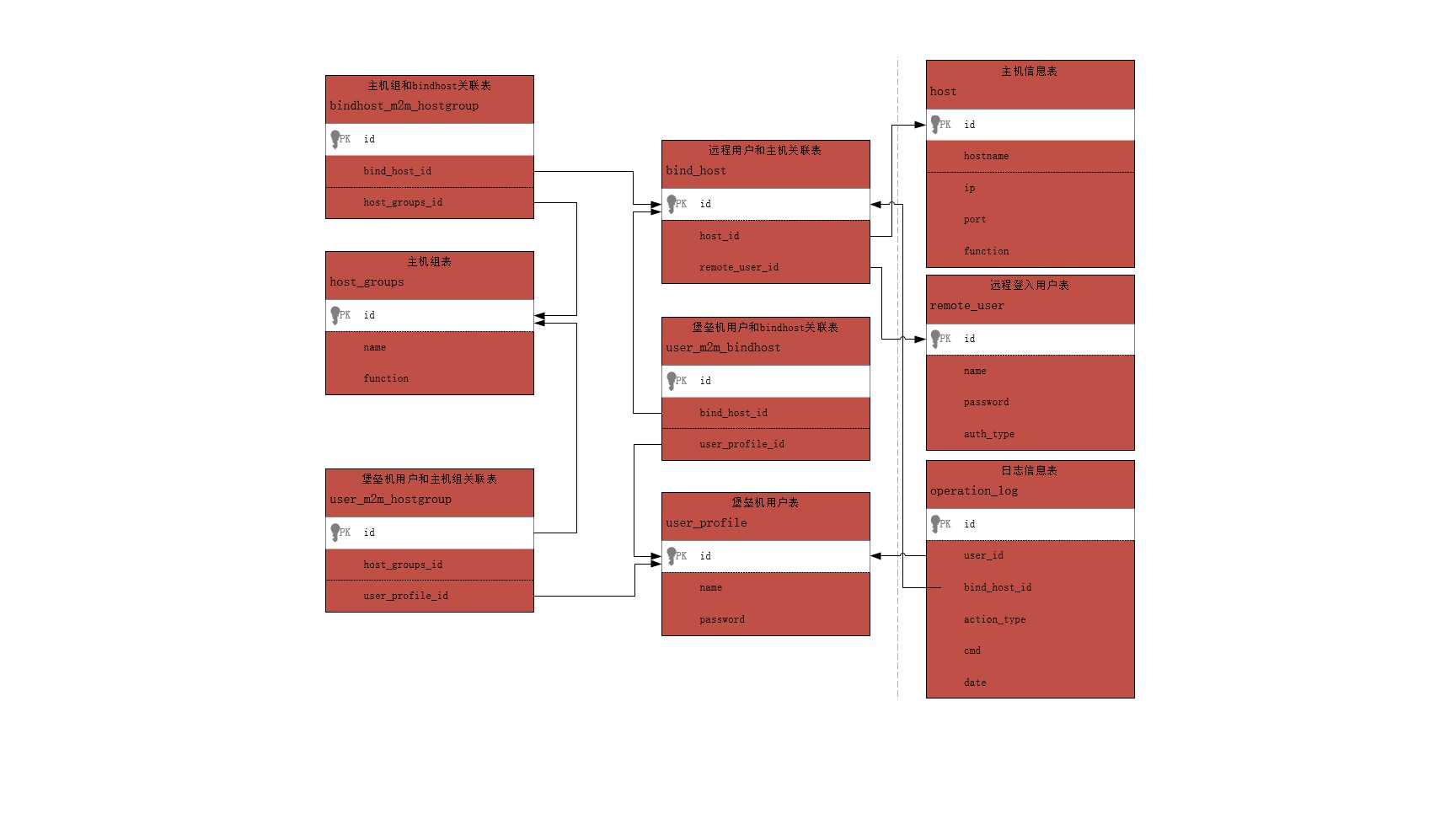一、堡垒机表结构

二、创建表

# -*- coding: UTF-8 -*- from sqlalchemy.ext.declarative import declarative_base from sqlalchemy import Column, Integer, String, UniqueConstraint, Table, ForeignKey, DateTime from sqlalchemy.orm import relationship from sqlalchemy_utils import ChoiceType Base = declarative_base() # 堡垒机用户和远程主机的关联 user_m2m_bindhost = Table("user_m2m_bindhost", Base.metadata, Column("id", Integer, primary_key=True), Column(‘user_profile_id‘, Integer, ForeignKey("user_profile.id")), Column(‘bind_host_id‘, Integer, ForeignKey("bind_host.id"))) # 远程主机和主机组关联 bindhost_m2m_hostgroup = Table("bindhost_m2m_hostgroup", Base.metadata, Column("id", Integer, primary_key=True), Column(‘host_groups_id‘, Integer, ForeignKey("host_groups.id")), Column(‘bind_host_id‘, Integer, ForeignKey("bind_host.id"))) # 堡垒机用户和主机组关联 user_m2m_hostgroup = Table("user_m2m_hostgroup", Base.metadata, Column("id", Integer, primary_key=True), Column(‘user_profile_id‘, Integer, ForeignKey("user_profile.id")), Column(‘host_group_id‘, Integer, ForeignKey("host_groups.id"))) class Host(Base): # 主机表 __tablename__ = ‘host‘ id = Column(Integer, primary_key=True) hostname = Column(String(64), unique=True) ip = Column(String(64), unique=True) port = Column(Integer, default=22) def __repr__(self): return self.hostname class HostGroup(Base): # 主机组表 __tablename__ = ‘host_groups‘ id = Column(Integer, primary_key=True) name = Column(String(64), unique=True) function = Column(String(64)) bind_hosts = relationship(‘BindHost‘, secondary=‘bindhost_m2m_hostgroup‘, backref=‘host_group‘) def __repr__(self): return self.name class RemoteUser(Base): # 远程用户表 __tablename__ = ‘remote_user‘ # 联合唯一 __table_args__ = (UniqueConstraint("auth_type", "username", "password", name="_user_password_uc"), ) id = Column(Integer, primary_key=True) username = Column(String(32)) password = Column(String(128)) # 第1个值存数据库,第2个值是sqlalchemy显示的 AuthTypes = [ ("ssh-password", "SSH/Password"), ("ssh-key", "SSH/KEY") ] # 设置枚举值 auth_type = Column(ChoiceType(AuthTypes)) def __repr__(self): return self.username class BindHost(Base): ‘‘‘ 绑定主机组、主机和远程用户 ‘‘‘ __tablename__ = ‘bind_host‘ __table_args__ = (UniqueConstraint("host_id", "remoteuser_id", name="_host_remoteuser"),) id = Column(Integer, primary_key=True) host_id = Column(Integer, ForeignKey(‘host.id‘)) remoteuser_id = Column(Integer, ForeignKey(‘remote_user.id‘)) host = relationship(‘Host‘, backref=‘bind_hosts‘) remoteuser = relationship(‘RemoteUser‘, backref=‘bind_hosts‘) def __repr__(self): return "%s %s" % (self.host.ip, self.remoteuser.username) class UserProfile(Base): # 堡垒机用户表 __tablename__ = ‘user_profile‘ id = Column(Integer, primary_key=True) username = Column(String(32), unique=True) password = Column(String(128)) bind_hosts = relationship("BindHost", secondary=‘user_m2m_bindhost‘, backref=‘user_profile‘) host_groups = relationship("HostGroup", secondary=‘user_m2m_hostgroup‘, backref=‘user_profile‘) def __repr__(self): return self.username class AuditLog(Base): # 日志表 __tablename__ = ‘audit_log‘ id = Column(Integer, primary_key=True) user_id = Column(Integer, ForeignKey(‘user_profile.id‘)) bind_host_id = Column(Integer, ForeignKey(‘bind_host.id‘)) action_choices = [ (0, ‘CMD‘), (1, ‘Login‘), (2, ‘Logout‘), (3, ‘GetFile‘), (4, ‘SendFile‘), (5, ‘Exception‘), ] action_choices2 = [ (u‘cmd‘, u‘CMD‘), (u‘login‘, u‘Login‘), (u‘logout‘, u‘Logout‘), # (3,‘GetFile‘), # (4,‘SendFile‘), # (5,‘Exception‘), ] action_type = Column(ChoiceType(action_choices2)) # action_type = Column(String(64)) cmd = Column(String(255)) date = Column(DateTime) user_profile = relationship("UserProfile", backref=‘audit_logs‘) bind_host = relationship("BindHost", backref=‘audit_logs‘) def __repr__(self): return "%s %s %s" % (self.date, self.action_type, self.cmd) if __name__ == ‘__main__‘: pass

